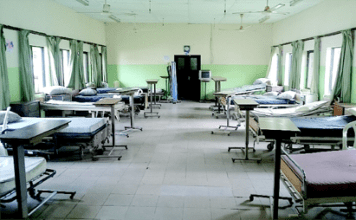The United States Agency for International Development has reported that Nigeria’s health indicators are among the poorest in Africa, influencing the overall socioeconomic indicators for the continent.
Despite having the largest economy in sub-Saharan Africa, Nigeria needs to address substantial development and governance hurdles to maximize its capabilities, as emphasized by USAID.
As per the information published on USAID’s official website, Nigeria is experiencing rapid population growth, projected to reach 440 million by 2050, presenting one of the fastest-growing populations worldwide.
“With an estimated population of 214 million, of which approximately 96 million people live on less than $1.90 per day, Nigeria is home to the world’s largest population living in extreme poverty.
“Also, with 5.5 live births per woman and a population growth rate of 3.2 per cent annually, it is estimated to reach 440 million people by 2050. Also, with its rapidly growing population and development challenges, the country drags down the socioeconomic indicators for the entire African continent,” USAID lamented.
According to estimates from the World Health Organisation, Nigeria recorded almost 67 million cases in 2022, representing 27% of the global malaria burden.
The WHO highlighted that in 2022, Nigeria was responsible for 31% of global deaths and 38% of global deaths in children under five years old, underscoring the urgency for action and intervention.
In response to Nigeria’s high mortality rates, Wakadaily discovered that USAID’s assistance to the country improved access to high-quality family planning and reproductive health services, vaccinations, efforts to eradicate polio, measures to prevent malaria, and maternal healthcare services.
“We work with the Government of Nigeria to encourage greater budget expenditures for health. In partnership with the Centres for Disease Control and the U.S. Department of Defense Walter Reed Programme, we assist Nigeria to build its capacity to manage HIV/AIDS and Tuberculosis cases by strengthening the primary health care system and focusing efforts on prevention, detection, and treatment.
“USAID works in Nigeria to promote broad, inclusive economic growth, food and nutrition security, a healthier, better-educated population, accountable, inclusive, and responsive governance, gender equality, access to renewable energy, and stability, including humanitarian assistance, in areas devastated by extremist violence. These activities take place throughout the country,” the agency mentioned.
Sara Werth, Deputy Mission Director of USAID, praised the collaboration between the Federal Ministry of Health and the US government in enhancing and strengthening malaria services for the future.
She emphasized that Malaria is a deadly illness caused by parasites that are spread to humans through the bites of infected female Anopheles mosquitoes.
“As we reflect on the challenges and triumphs in our collective battle against malaria, let us reaffirm our commitment to a future where no family in Nigeria fears the threat of this disease.
“I urge the government of Nigeria to invest in making malaria programming more efficient and effective using data and other evidence to inform malaria implementation and drive faster results,” Werth restated.
The USAID report outlined the significant aid it has provided to Nigeria, particularly the collaboration between the U.S. President’s Malaria Initiative and Nigeria to combat malaria since 2011, with contributions totaling $914 million thus far and $73 million in 2023.
Additionally, it was mentioned that through PMI funding and initiatives, USAID distributed 13.4 million bed nets, 6 million rapid-acting medicines, and 11.8 million Malaria Rapid Diagnostic Tests to healthcare facilities and communities in Nigeria within the previous year.
“In 2023, more than 7,200 health workers were trained to strengthen their skills in malaria detection, treatment, and how to provide lifesaving care for their communities.
“The country has the second largest number of people living with HIV globally and accounts for nine per cent of the global HIV burden. The U.S. Government, through the President’s Emergency Plan for AIDS Relief, currently assists over 600, 000 Nigerians with life-saving HIV therapy, which is 90 per cent of the people living with HIV/AIDS in the country.
“Activities focus on expanding programmes that prevent transmission to the most at-risk populations, while also stopping the high rate of mother-to-child transmission. More than one million children orphaned and made vulnerable by HIV receive care and support through these programmes.
“We support quality tuberculosis treatment for adults and children by linking them to primary health care centres and resources, including laboratory test kits and anti-retroviral medications.”
The report highlighted that in 2015, the organization provided assistance in diagnosing and reporting about 40,000 individuals affected by TB, with plans to double that figure by the conclusion of 2017.
In 2016, working alongside Nigeria’s National Tuberculosis Programme, USAID introduced a new treatment regimen for Multi-Drug Resistant Tuberculosis, which is expected to substantially reduce the duration of treatment.
Regarding reproductive, maternal, and child health initiatives, the USAID Reproductive Maternal and Child Health program reached more than 60 million Nigerians with essential services, such as training for healthcare professionals and enhancing access to quality medications, vaccines, healthcare facilities, and materials related to reproductive health.
“Our activities improve governance and leadership at all levels of the health sector and support the development of robust, equitable, and efficient health financing system,” it added.
Alternatively, Professor Tanimola Akande, a Consultant Public Health Physician at the University of Ilorin Teaching Hospital in Kwara State, emphasized the need for increased funding and investment in the healthcare sector by the Nigerian government at all levels to take ownership of the health system and guarantee drug security and disease management.
He mentioned, “Health care financing through the government has, unfortunately, for so long been much below the benchmark set during the Abuja declaration of 15 per cent of the budget.
“Though there is a marginal increase over 2023 in the 2024 budget about to be passed. Yet, this is still a far cry from meeting the financial gaps in the health sector. Governments at all levels in Nigeria will need to do more for the health sector.
“Other options of financing health in Nigeria, like health insurance and public-private partnership, will have to be worked on to attempt bridging the gap.”
